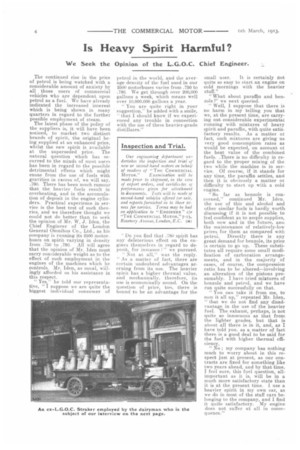Is Heavy Spirit Harmlul ?
Page 4

If you've noticed an error in this article please click here to report it so we can fix it.
We Seek the Opinion of the L.G.O.C. Chief Engineer.
The continued rise in the price of petrol is being watched with a considerable amount of anxiety by all those users of commercial vehicles who are dependent upon petrol as a fuel. We have already indicated the increased interest which is being shown in many quarters in regard to the further possible employment of steam.
The latest phase of the policy of the suppliers is, it will have been noticed, to market two distinct brands of spirit, the original being supplied at an enhanced price, whilst the new spirit is available at the superseded price. The natural question which has occurred to the minds of most users has been in regard to the possible detrimental effects which might ensue from the use of fuels with gravities in excess of, we will say, .760. There has been much rumour that the heavier fuels result in overheating, and in the accumulation of deposit in the engine cylinders. Practical experience in service is, the best test of such theories, and we therefore thought we could not do better than to seek the opinion of Mr. W. J. Iden, the Chief Engineer of the London General Omnibus Co., Ltd., as his company is running its 2500 motorbuses on spirit varying in density from .750 to .780. All will agree that the opinion of Mr. Iden must carry considerable weight as to the effect of such employment in the engines of the machines which he controls. Mr. Iden, as usual, willingly afforded us his assistance in this respect.
" Yes," he told our representative, "I suppose we are quite the biggest individual consumer of petrol in the world, and the average density of the fuel used in our 2500 motorbuses varies from .750 to .780. We get through over 200,000 gallons a week, which means well over 10,000,000 gallons a year.
" You are quite right in your suggestion," he added with a smile, "that I should know if we experienced any trouble in connection with the use of these heavier-grade distillates."
"Do you find that .780 spirit has any deleterious effect on the engines themselves in regard to deposit, for instance l" we pursued.
" Not at all," was the reply. " As a matter of fact, there are certain undoubted advantages accruing from its use. The heavier spirit has a higher thermal value, and mechanically, therefore, its use is economically sound. On the question of price, too, there is bound to be an advantage for the small user. It is certainly not quite so easy to start an engine on cold mornings with the heavier stuff."
"What about paraffin and benzole?" we next queried. " Well, I suppose that there is no harm in my telling you that we, at the present time, are carry ing out considerable experimental running with mixtures of heavy spirit and paraffin, with quite satis factory results. As a matter ox fact, such mixtures are giving us very good consumption rates as would be expected, on account of the heat value of the combined fuels. ,There is no difficulty in re gard to the proper mixing of the two while the machine is in ser vice. Of course, if it stands for any time, the paraffin settles, and then it is obviously a matter ox difficulty to start up with a cold engine. "So far as benzole is concerned," continued Mr. Iden, the use of this and alcohol and other similar fuels is hardly worth
discussing if it is not possible to
feel confident as to ample supplies, both now and in the future, ano the maintenance of relatively-low prices for them as compared with
petrol. Directly there .is any
great demand for benzole, its price is certain to go up. These substitutes all require some small modi fication of carburation arrange ments, and in the majority . of cases, of course, the compression ratio has to be altered—involving an alteration of the pistons presumably. I have tried mixtures of benzole and petrol, and we have run quite successfully on that.
"You can take it from me, to sum it all up," repeated Mr. Iden, "that we do not find any disad vantage in the use of the heavier fuel. The exhaust, perhaps, is not quite so innocuous as that from the lighter grades, but that is about all there is in it, and, as I have told you, as a matter of fact there is a good deal to be said for the fuel with higher thermal efficiency. " No ; my company has nothing much to worry about in this re spect just at present, as our con tracts are fixed for something like two years ahead, and by that time, I feel sure, this fuel question, all important as it is, will be in a much more satisfactory state than it is at the present time. I use a heavier spirit in my own car, as we do in most of the staff cars be longing to the company, and I find it quite satisfactory. My engine does not suffer at all in consequence."
























